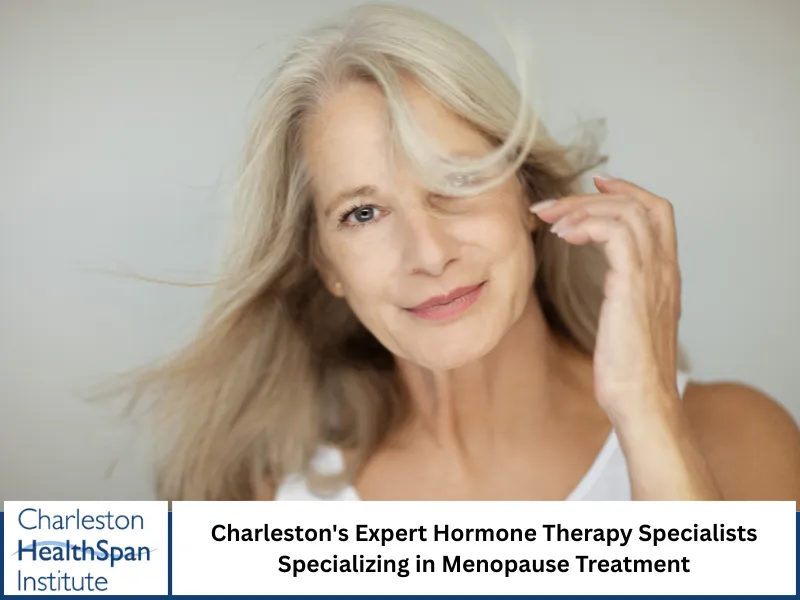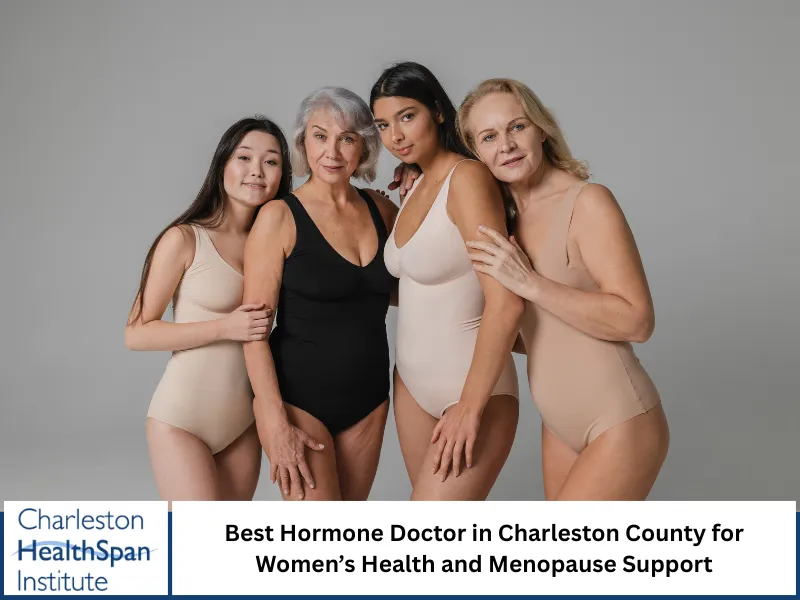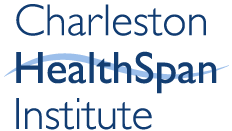Menopause Doctor in Charleston, South Carolina — Charleston Healthspan Institute

Charleston's Expert Hormone Therapy Specialists Specializing in Menopause Treatment
Menopause Doctor in Charleston, South Carolina—Charleston Healthspan Institute offers compassionate and expert care for women navigating menopause. Many women experience disruptive symptoms like hot flashes, night sweats, and changes in mood that can impact everyday life.
As a leading Hormone Therapy Specialists, our focus is on truly listening to you and understanding what you need. Our personalized approach uses proven therapies to address problems at the source, not just the symptoms. With years of experience supporting menopausal women, we deliver tailored hormone therapy services that help you feel like yourself again.
You deserve a trusted healthcare provider who genuinely cares about your wellbeing—let us help you regain comfort, confidence, and control.
Frequently Asked Questions
At what age does menopause start?
At Charleston Healthspan Institute, our menopause doctor in Charleston, SC often sees menopause symptoms begin for most women between ages 45 and 55. Some menopausal women notice early menopause in their early 40s, while others might not experience the menopausal transition until later. The ovaries slowly decrease estrogen production, which leads to symptoms like hot flashes, irregular periods, and sleep problems. For some, premature menopause can occur before age 40, which can be caused by genetics or medical treatment.
Key things to know:
- There’s no exact age—every woman’s body is different.
- Perimenopause, which is the lead-up to menopause, can last several years.
If you are noticing symptoms and want menopause relief or management, our Hormone Therapy Specialists can help you explore your options for menopause treatment and menopause support, including hormone replacement therapy or bioidentical hormone therapy.
What are the 5 stages of menopause?
Understanding menopause is important for menopause management and menopause care. At Charleston Healthspan Institute, our hormone therapy doctor will guide you through each stage:
- Premenopause: Regular menstrual cycles, few menopause symptoms.
- Perimenopause: Hormone levels start to fluctuate, leading to symptoms like hot flashes and irregular cycles.
- Menopause: Officially starts when you haven’t had a period for 12 months.
- Postmenopausal women: The years after menopause; symptoms may continue but often decrease.
- Late postmenopause: Long-term health management as your body adjusts to lower estrogen levels.
Our hormone doctor in Charleston, SC uses proven menopause resources to help you at each step. We offer menopause support with advanced menopause treatment and hormone therapy service, including estrogen therapy, BHRT, and HRT.
- Premenopause: Regular menstrual cycles, few menopause symptoms.
What to do when menopause starts?
When menopause symptoms begin, it’s important to get trusted menopause care and support. Charleston Healthspan Institute is a Hormone Therapy Specialists dedicated to helping menopausal women with every step of the menopausal transition.
What you can do:
- Schedule a visit with a menopause doctor in Charleston, SC for a full assessment.
- Track symptoms: Write down changes in periods, mood, hot flashes, or other body changes.
- Discuss hormone replacement therapy, BHRT, or estrogen therapy with your hormone specialist.
- Explore menopause resources and stay informed about available menopause treatment options.
- Focus on health: Eat a balanced diet, exercise, and manage stress for better overall wellbeing.
Our hormone doctor in Charleston, SC can create a personalized menopause relief plan. For more info about our hormone therapy service, contact us today.
- Schedule a visit with a menopause doctor in Charleston, SC for a full assessment.
At what stage is menopause the worst?
Many patients ask our menopause doctor in Charleston, SC about the most challenging part of menopause. The perimenopause stage is often when symptoms like hot flashes, night sweats, and mood swings are most intense. This transition can cause daily disruptions, but our Hormone Therapy Specialists can help you find real menopause relief.
- Symptoms often peak during perimenopause, which can last for several years.
- Every woman’s experience is unique: Some feel worse during the menopausal transition, while others find postmenopausal women have lingering symptoms.
- Our hormone doctor in Charleston, SC provides advanced menopause treatment, including hormone therapy service, hormone replacement therapy, BHRT, and estrogen therapy to manage symptoms effectively.
Our team at Charleston Healthspan Institute offers compassionate menopause support and management to help you feel better at every stage.
- Symptoms often peak during perimenopause, which can last for several years.
Do you age quickly after menopause?
A common concern among menopausal women is whether menopause causes rapid aging. As a leading Hormone Therapy Specialists, Charleston Healthspan Institute helps you understand what really happens. The drop in estrogen after menopause can affect skin, bone density, and metabolism, which may lead to visible signs of aging. However, aging is influenced by many factors, not just hormones.
What to know:
- You don’t “age overnight.” Changes occur gradually.
- Healthy lifestyle choices and menopause treatment can make a big difference.
- Our hormone doctor in Charleston, SC will recommend options like hormone replacement therapy, BHRT, or estrogen therapy if it’s appropriate for your health.
- Menopause support includes guidance on nutrition, exercise, and routine screenings.
Our hormone specialist uses menopause resources and the latest menopause management strategies to help you feel and look your best—so you can continue to enjoy life confidently.
Physical Locations
Areas We Serve
Best Hormone Doctor in Charleston County for Women’s Health and Menopause Support
Menopause literally means cessation of menses or the stopping of periods. A woman’s menopause is an event, not a time period, and is defined as not having a period for a year. Actually, a woman reaches menopause a year prior to it being defined as such. The average age for menopause in American women is 51 and 95% of women will be menopausal between the ages of 40 & 58.
The perimenopause is really what most women think of as “going through the menopause” or “going through the change (of life).” It is defined as the period prior to menopause and the first year after menopause when endocrinologic, biologic, and chemical features of approaching menopause commence. The average age for onset of perimenopause is 47, and for most women it lasts approximately four years. Only about 10% of women cease menstruating abruptly and have no menstrual irregularity characteristic of the perimenopause.
During the perimenopause, the endocrinologic or hormonal changes are quite varied and can lead to many different clinical syndromes. The clinical presentations generally involve some, if not all, of the following:

Common Symptoms of Menopause
All of these symptoms, to some degree, are related to changes in hormone effect brought about by a gradual decline in ovarian function.
Estrogen, progesterone and testosterone are the primary ovarian hormones, which are in various stages of decline, and the relative lack of these hormones brings about the symptoms listed.
- Irregular menses – Changes in frequency, flow, duration.
- Mood changes
- Weight gain or changes in weight distribution
- Vasomotor symptoms – Hot flashes, night sweats
- Sleep disturbance
- Vaginal dryness
- Urinary incontinence, frequency, & urgency
- Urinary tract infection
- Depression & anxiety
- Decreased cognitive function – memory, concentration
- Decreased libido
- Skin & hair changes
In essence the normal balance or interaction of ovarian hormones, which has existed for 20+ years, is disturbed. Generally speaking, in the perimenopause there is often a wide fluctuation in estrogen levels-sometimes low, often high or normal; the point is that there is frequent change as opposed to more stable levels. Progesterone is usually low, and this is believed by some to be the key common denominator in the perimenopause. Testosterone levels are usually declining or low, and may have been on a downward trend for many years prior to the perimenopause.
At the menopause, ovarian failure results in the decline of estrogen and progesterone and usually also testosterone. A lack or imbalance in these hormones results in an increased risk of the symptoms enumerated above as well as the following:
- Alzheimer’s disease
- Urogenital atrophy
- Heart disease
- Osteoporosis
- Colon cancer
It is because of these symptoms and increase in the diseases of aging that we advocate bioidentical hormone replacement therapy (BHRT) for most women. For more on BHRT, refer the section on Hormone Replacement Therapy.
Schedule Your Consultation with a Menopause Doctor in Charleston, SC
A Menopause doctor in Charleston, SC at Charleston Healthspan Institute is ready to help you find real relief from menopause symptoms. Whether you are considering bioidentical hormone therapy or need guidance from an experienced hormone doctor, our team is here to support you every step of the way.
We make it simple to get started—just call us, fill out our contact form, or visit our website for more details about our Hormone Therapy Specialists and services. Every patient receives a personalized care plan built around your needs and goals.
Don’t wait to take control of your health and wellbeing. Connect with us today and discover how the right menopause treatment can make all the difference.


